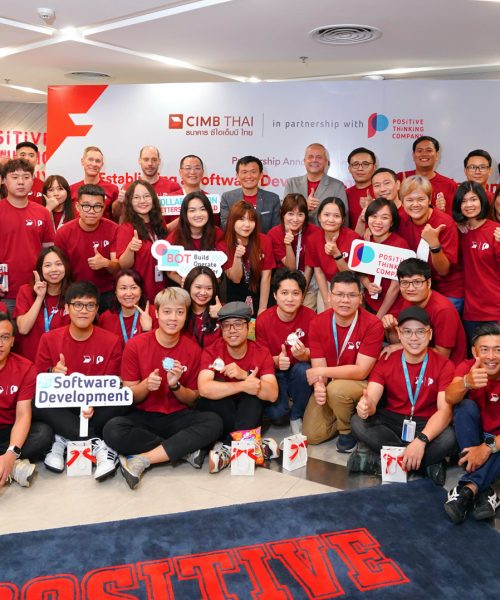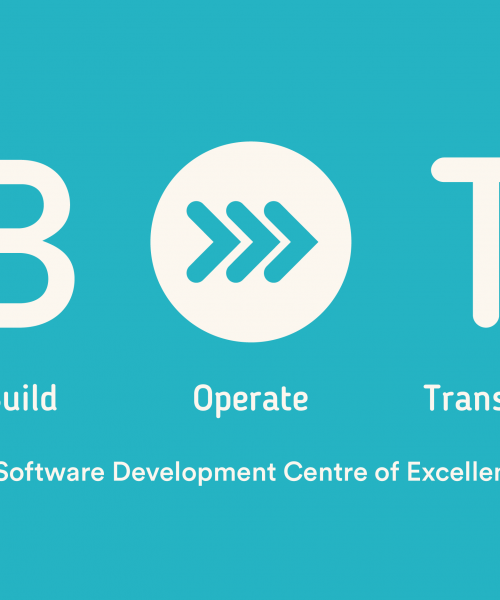In today’s rapidly changing economy and fast-paced digital landscape, businesses that fail to embrace technology risk falling behind their competitors. In this article, we’ll look at the importance of digital transformation during a fast-changing economy and offer insights into how businesses can (and should!) continue implementing their digital roadmaps throughout the remainder of 2023.
A Quick Look at APAC Economies
APAC economies are predicted to be the fastest growing throughout most of 2023 with a forecast real growth GDP of around 4.2%. The APAC region currently contributes around 35% of global GDP, benefiting from competitive pricing, mature supply chains, and free-trade agreements. It is highly likely the region will play a significant role in staving off any worsening of the economic situation and restricting pullbacks in western markets. Some of the key economies that will drive global growth in 2023 are China, India, Indonesia, Vietnam, and the Philippines.
Looking at Singapore, the Ministry of Trade and Industry is maintaining a GDP growth forecast for 2023 at “0.5 to 2.5 percent” (S&P Global predicts 2.3%). The Singapore economy grew by 0.4% on a year-on-year basis in the first quarter of 2023, moderating from the 2.1% expansion in the previous quarter. The Singapore central bank has also halted its tightening cycle, maintaining its exchange rate policy band after five-straight decisions to tighten.
And in Australia, we see that after an exuberant economic rebound throughout 2021 and 2022, growth rates – although also levelling off – are still ahead of global averages. S&P Global predicts GDP growth of 1.7% in 2023 and 1.9% in 2024.
Future-Proofing Digital Strategies
As companies take note of the cooling economic climate, we are seeing budgets cut across the board. But, despite this, digital transformation spending will still grow throughout 2023 and into 2024, regardless of the cooling economic climate. The projected direct digital transformation (DX) investment is expected to touch $6.8 trillion by 2023.
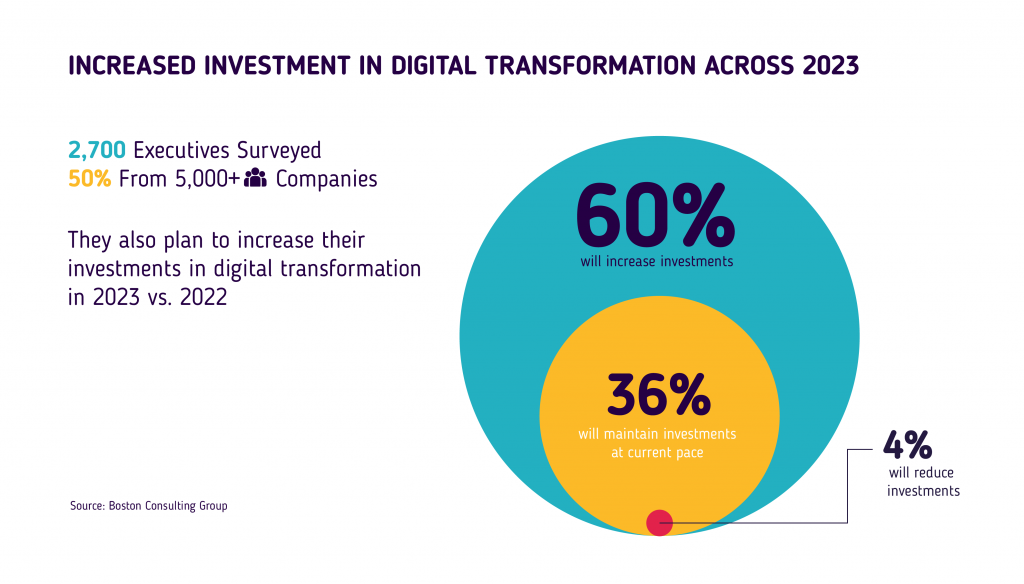
Two-thirds of the executives polled by Boston Consulting Group have said they plan to spend more money on digital initiatives in 2023 than in previous years. In comparison, only 4% of the managers polled reported a reduction in technology spending.
On top of this, Gartner’s 2022-2023 financial playbook reported that digital decisions played a key factor in who prospered and who sank after the 2008–2009 period of economic downturn. 94% of CEOs want to maintain or accelerate the existing rapid pace of digital transformation triggered by the pandemic, and 70% of CFOs anticipate increased funding for digital technology.
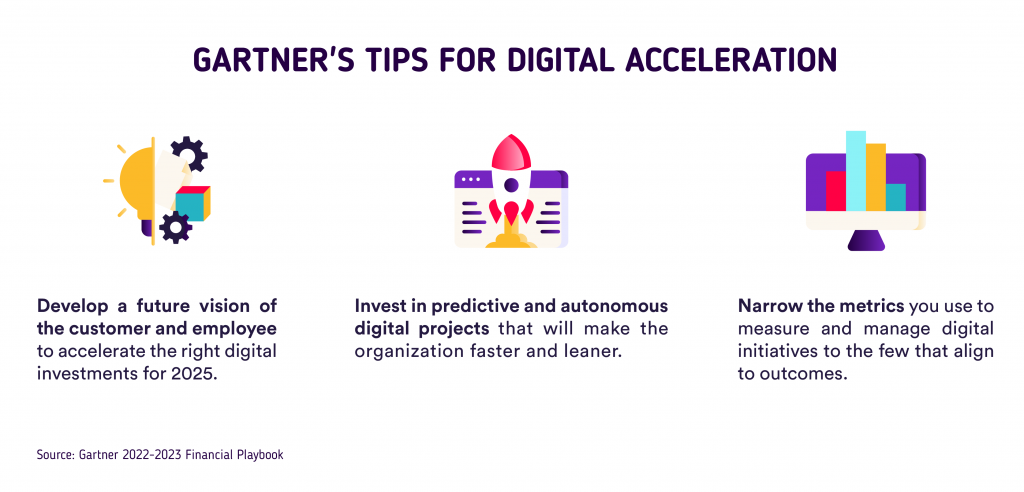
Our Tips for success – Stay the course!
So, despite some gloomy sentiment surrounding global markets, we see companies that halt their digital initiatives will risk falling behind in today’s rapidly evolving digital landscape. Here are our key insights for companies looking to come out ahead during this challenging period.
Place Digital in Everything You Do
By incorporating digital across all aspects of their operations, companies can unlock a multitude of advantages. These include enhanced customer experiences, a competitive edge, streamlined operations, data-driven decision-making, agility, innovation, and many more.
- Customer-centric approach: Place the customer at the center of digital transformation efforts. Understand customer needs, preferences, and pain points to develop digital solutions that deliver personalized experiences, convenience, and value.
- Leverage data-driven insights: Tap into the power of data analytics and AI to gain valuable insights about customer behavior, market trends, and operational performance. Use data to make informed decisions, optimize processes, identify growth opportunities, and drive innovation.
- Platform innovation: Accelerating digital platforms could also help companies thrive in the current and future digital age. Watch our exclusive Positive TechBits interview series – Episode 1: The Power of Digital Platform to hear from our industry expert on how innovative digital platforms empower businesses to stay competitive, enhance operational efficiency, deliver exceptional customer experiences, and enable scalability.
- Agile methodologies: Implement agile methodologies, such as Scrum or Kanban, to enable faster development cycles, iterative improvements, and rapid deployment of digital solutions. Agile practices promote flexibility and adaptability, allowing companies to respond to market changes swiftly while keeping their investment budget under control.
- DevOps and Automation: Adopting DevOps practices and automation tools streamlines the software development lifecycle. Automated testing, continuous integration, and deployment automation enhance efficiency, speed up time-to-market, and reduce manual errors.
- Integration and Interoperability: Investing in integration capabilities enables seamless connectivity between software applications, systems, and data sources. Integration frameworks, APIs, and middleware facilitate efficient data exchange and interoperability, improving overall system functionality, scalability and feature evolution.
- Ongoing maintenance and support: Companies should allocate resources for ongoing software maintenance and support. Regular updates, bug fixes, and user support are essential for a smooth user experience and the long-term success of the software.
Build the right Engineering Team for Your Need
Assembling the right software development teams to work on specific projects or products also helps businesses advance their digital transformation roadmap and achieve long-term business success with an impressive return on investment (ROI).
There are two primary approaches to consider when it comes to building an ideal software engineering team:
Outsource flexible engineering squads
If your business is more focused on achieving specific project goals and delivery within a defined timeframe such as maintaining or building web and mobile apps, deploying new features on your platforms, etc., building a flexible software development team should be the most suitable solution.
A project team is often composed of a smaller group of developers with specialized skills relevant to the project requirements. Once the project is completed, you can decide to either maintain, scale down, or simply disband the team based on your business plan.
Check out our newly published Case Study to see how our APAC team quickly built up a team of 30 senior Mobile and Node.js developers to develop a cashless payment app for one of the world’s largest digital payment providers, to provide the app users with both non-cash payment methods and seamless entertainment experiences – all in one app.
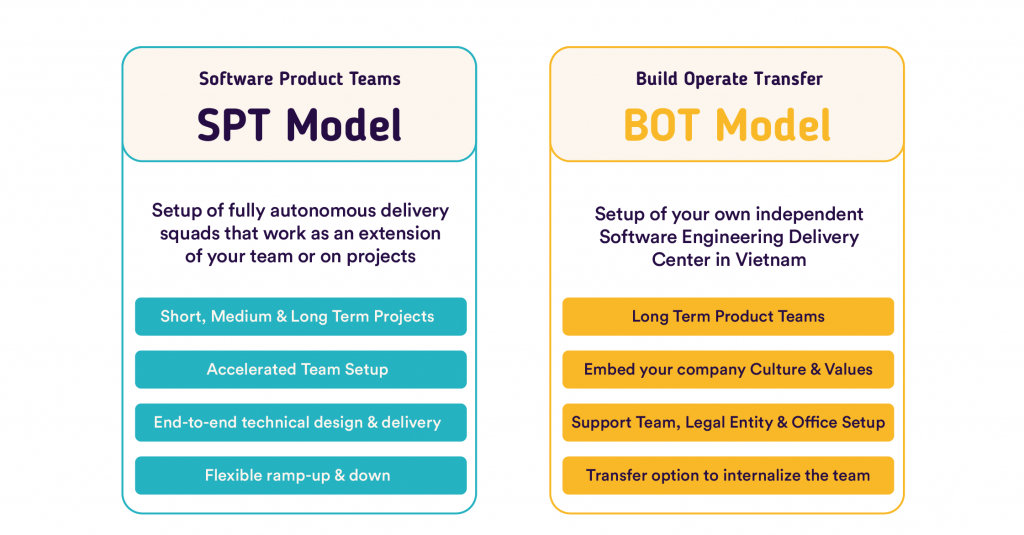
Our two service models in APAC
Set up dedicated software development centers
On the other hand, if the long-term strategy of your business is to establish a sustainable and scalable software development capability, building your dedicated software development center would be the right approach. A software development center is a more permanent establishment intended to support ongoing software development efforts across multiple projects or products of your business.
During 20+ years of operation, our APAC Team has established more than 15 software development centers to assist our global clients (Atlassian, National Australia Bank, Ansarada, MessageMedia, and many more) in accelerating their digital transformation journeys, through our bespoke and cost-effective Build Operate Transfer (BOT) model. This BOT model allows you to focus on your business goals and KPIs while leaving the day-to-day operations of the software development center in our capable hands.
Read our latest Press Release on our strategic partnership with CIMB Thai Bank on establishing the Software Development Center for CIMB Thai in Hanoi, Vietnam. The Vietnam team is working closely with the CIMB’s engineering teams in Thailand to deploy new features and enhancements on the CIMB Thai mobile banking application as well as other digital touchpoints.
Find the right Tech Partner to Help you Scale
Working with an experienced and trusted tech partner can also help provide cost-saving benefits and accelerate your digital products or project roadmaps. By leveraging a remote partner’s extensive talent pool of highly skilled engineers, businesses can reduce their hiring effort and labour expenses allowing them to focus on their core business KPIs.
Some other potential savings from choosing the right technology partner include lower legal costs, affordable operational expenses, or a possibly advantageous tax system in a remote location. There is also the option to retain flexibility and scalability with your software development teams, allowing you to prioritize your immediate needs and adapt to rapidly changing goals or circumstances.
Just take a look at how we partnered with NAB (National Australia Bank) to set up their first dedicated software development centre in Vietnam with 650+ engineers and consultants within just 2.5 years to help them scale up their engineering capabilities through our BOT model. The NAB Innovation Centre has been one of the fastest-growing tech centres in Vietnam with 1,000+ talents currently employed.
We are Here to Help
As a trusted technology partner with over 20 years of experience in the APAC region, we pride ourselves on our ability to offer best-in-class software development services to help you hasten your digital transformation. Our core services in APAC:
Software Product Engineering: Looking for top-quality software product engineering services? Look no further! Our agile methodologies, advanced technology, and multidisciplinary teams enable us to develop cutting-edge apps that drive results for our clients worldwide.
Build Operate Transfer (BOT) Model: Do you want to expand your development teams and accelerate your product roadmap? Our unique BOT model offers a highly scalable and cost-efficient solution to help you build your own engineering teams in Vietnam without outsourcing your software development.
Whether you are looking to accelerate your digital transformation or drive innovation in your industry, we have the expertise and experience you need. Contact us for more information about our APAC expert software development teams!


